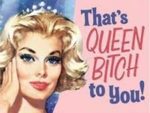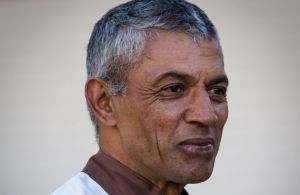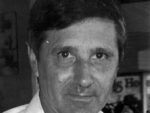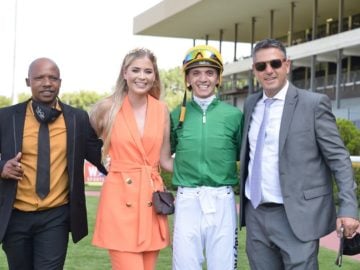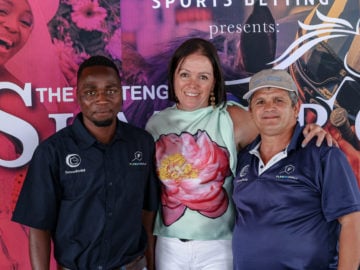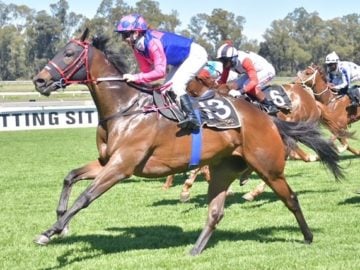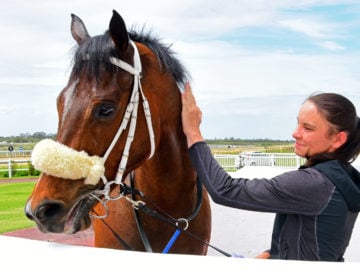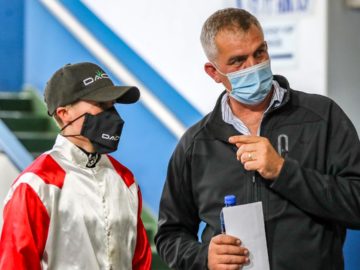Senior statesman of the jockey room, Fareed Anthony has an absolutely fascinating family history, including an Indonesian prince, captured and brought to South Africa during the slave trade era. The family were originally based in Simon’s Town and made a living by trading. Interestingly, a number of the Anthony family members are commemorated in the Simon’s Town museum. Simon’s Town was declared a White Group Area in 1967 and the family was displaced to the Southern Suburbs. The journeyman jockey has been riding for 34 years and was our first person of colour to qualify through the SA Jockey Academy.
Tell us about Fareed Anthony. “I was born on 29 September 1964 in Kensington in Cape Town. I’m from a large family. My mother was my father’s third wife. He had 5 children from the first two wives and then had 5 kids with my mother as well. I was their second child. I have an older sister, then two younger sisters and a younger brother, Zaid. My grandmother was from Holland. She could speak Dutch and used to give us crowns to buy sweets.”
How did the horse connection come about? “My family were traders and we couldn’t afford cars in those days, so everything had to be done by horse and cart. We grew up with horses. My father always had a horse as did all his brothers. We mainly had Hackneys and show ponies. We’d go to the big Goodwood show at the end of every year. It was a big thing and we’d stay over at the showgrounds with our horses.”
What made you decide to pursue a career as a jockey? “We eventually moved to a smallholding in Philippi. I got to know people like Lesley Blake, ‘Doc’ de Villiers and Porky Dawson, who all had Cape Hunt horses. In fact, Lesley Blake was the first person to put me on a racehorse. I used to spend a lot of time helping around the horses and occasionally got to ride. And that’s how my racing interest started really. My father and his brothers used to go racing and one day they saw a notice in the racecard that the Academy were accepting people of colour for the first time. I was fairly small for my age and ‘Doc’ de Villiers suggested I apply, so we did. I finished Std 7 and during the December school holidays, Mr De Villiers took me into Cape Town for my interview and I got accepted. I joined the Academy at Summerveld in January 1980.”
How was your time at the Academy? “There were around 15 of us first years and the ‘people of colour’ intake included myself and Warren Sudan from Zimbabwe. Gerrit Schlechter was the only other apprentice from Cape Town. The riding masters at the time were Cyril Buckham, David Cave and Vince Curtis. It was hard work. We had to be up at 4:30 to ride work, then back at 9:30 to shower, change and have breakfast and then it was off to school till about 2pm. After that, we did stable duty, mucking out and grooming till about 5pm. It was quite a full day.”
Did you have any problems being accepted? “It was quite a difficult time, but I stood my ground. I often got into trouble for fighting and at one stage the Academy threatened to throw me out, but Mr Buckham always had faith in me and during my second year, he’d invite me to spend all my ‘in’ weekends at his house to keep me out of trouble.”
“I had a few rides in Durban and rode for people like Syd Laird, Herman Brown snr and David Payne and I managed quite a few places in my first 12 qualifying rides. I moved back to Cape Town for my third year and was apprenticed to Ralph Rixon. I arrived back on a Thursday and he rang up and said “You’d better come to work tomorrow, you’re riding on Saturday’. Saturday was the 5th of December 1981. The horse was a filly called Tsarita and we won by half a length. It caused a riot on course. Those were the days where race goers were still segregated into the various rings, but the coloured people wanted to get closer to the parade ring to see me, so they just broke through the barriers. That’s probably still my most memorable day at the races.”
Despite holding his own against the other apprentices of his era, which included the likes of Gerrit Schlechter and Glen Hatt, Fareed had to battle the attitudes of local owners and trainers and confesses that it was hard getting rides. “Sometimes the trainers would put me on a horse, but then the owners wouldn’t want me riding for them and I’d be replaced. It got a bit awkward, so after a year with Mr Rixon I moved to Stan Elley. He was very fair to me and I learned a lot from my afternoons at the stables with him.” Fareed was champion apprentice for the 1982/83 season and saw out his apprenticeship with Stan Elley, qualifying on 27 December 1984. “Towards the end of my 5th year, I grew a bit and my weight went up, so I ended up as a middleweight jock. It was a very competitive era. Piere Strydom and Anton Marcus were just behind me. We had the likes of Felix Coetzee, Garth Puller and Karl Neisius as senior jockeys and there were 5 or 6 really good apprentices in Cape Town – trainers had their pick. The senior jockeys and Garth Puller and Karl Neisius in particular were very good to me and taught me the value of riding patiently.”
Do you feel that you were something of a trailblazer and perhaps opened the door for other jockeys of colour? “Riders who came after me were people like Hemant Ramlugan, Andrew Fortune, Mark Khan and Conrad Wilkinson – all very good riders in their own right. I never deliberately set out to set any benchmarks or prove anything. I was just trying to earn a living and put food on the table.”
Do you have any preference for tracks? “Milnerton was by far the best – it had a far bend, a near bend and a 1400m straight. I still think getting rid of that track was one of the biggest mistakes we ever made. Durbanville is difficult and horses tend to struggle a little first time round, but once they know it, they generally do it the right way. With Kenilworth, you’ve also got to know the track. Because of the track configuration and the cross-over, you have to help your horse quite a lot and Kenilworth races have a particular rhythm to them. People complain about the ‘Cape Crawl’, but it’s less about the jockeys wanting to slow down, than one having to help your horse negotiate certain sections of the track. It’s not an easy galloping track and you’ve got to know how to ride around there. What I do find strange is that our training track is on a right hand bend, but we race left handed. Explain that to me?”
Are the rest of your family into racing? “I took a break from racing just after the flu outbreak and got right out of it for a few years. I went and opened a fish and chip takeaway. That’s where I met my wife. One day I decided to start up again and I told her I was going to ride and she said ‘Ride what?’ I’d never told her I was a jockey,” he chuckles. “My younger brother Zaid rode in the Cape Hunt for a bit. Then he went off and worked as an assistant trainer for a bit and now he does equine dental work, so he’s also around horses all day.”
Tell us about your family? “I’m married to Gairo and we have four daughters (25, 23, 13 and 2). Gairo’s mother and grandmother also live with us. I believe that children are put there for you to look after. Having a big family is how I grew up and you all look out for one another. I’ve never been particularly ambitious, so I’ve never travelled much or wanted to chase any titles. I’m happy as long as I can take care of my family and make sure that my kids get a little more than I had.”
What do you feel are your strengths as a rider? “As they say, good horses make good jockeys. I don’t regard myself as an especially talented rider, but I seem to get along with most horses. I used to ride a lot of the difficult ones and I don’t mind it, actually. I just seem to get the best out of them. I ride a lot of work and I prefer to know my horses before I ride them in a race – it helps you judge how they are going during a race and you can feel whether they’re feeling good or not. I tend to ride a lot of weaker horses and with those types you need to relax and settle them just off the pace to give them every chance. It’s very rare for me to go to the front and usually if you do see me in front, the rest are going too slow! I’m fairly straightforward and I won’t lie to someone about a horse. If they can’t win with me from mid-field, well then they’re probably going to struggle.”
Do you have to work hard to keep your weight down? “I ride work every morning, 6 days a week and I run two or three times a week as well. I used to have to waste quite a lot in the early days, but since they adjusted the weights, it’s a bit easier and it’s not so hard anymore.”
What do you consider career highlights? “There’s nothing like a win and every win is special, no matter what level. It just gives you a boost and re-energises you. Every win is a highlight really. Flaming Rock was probably one of the big ones that I rode early on in his career, but I rode a lot of good horses that didn’t make it. One of the best I ever rode was a horse called State Crown for Piet Steyn. He finished just behind Jay Peg in the Selangor, the Guineas and the Derby. He looked like a camel and walked like a duck, but that was one of the best I ever rode.”
Any interests outside of racing? “My other passion is racing pigeons and I’ve been doing that for the last five years. Lesley Blake, who originally put me on a racehorse, is more or less the Terrance Millard of the pigeon world and he got me into it. I probably won’t race this season because we’re in the middle of moving house, but it’s a very exciting sport.”
And finally, what does the future hold? “There are a lot of youngsters coming in, but I feel I am still pretty competitive and the fact that I’ve got quite a bit of experience is also in my favour. There’s not a lot of time to think in a race – you’ve got to make a decision and then stick to it. But I’ve always enjoyed my racing and I’m lucky that I’ve never got stale or sour. I’ve always taken a break when I needed one and I think that’s helped. Even when I don’t have lots of rides, I’ll still hang around the jockey room for the day – I just enjoy being there. There’s nothing else I’d rather do.”
‹ Previous
